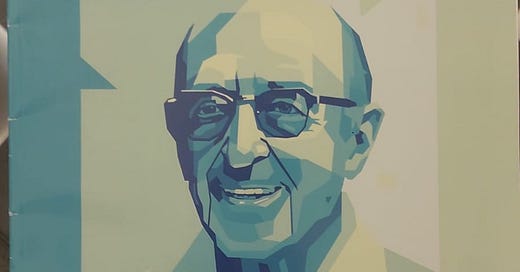June’s Serendipity
I had wanted to send out a hug for the simple (albeit immensely powerful souls) who invest time and energy into “just” understanding another - a friend, a sibling, a spouse. Arguably the most heroic voice that advocated for the massive importance of such understanding, was this guy in the picture above - Carl Rogers. It was quite serendipitous to see the British Association for Counselling and Psychotherapy jog British therapists’ memory about this psychologist’s work, right about the time I had intended to introduce him to all of you in the context of empathy.
A Hug - For All the Empaths
“Not solving others’ problems”
Here you are, face-to-face with the gut-twisting discomfort of witnessing your friend’s brain-melting ambivalence about a potentially life-changing decision - and you naturally want to solve this problem. Perhaps, your friend wants you to solve this problem for her as well (or she may think that’s what she wants you to do; many times, subconsciously, we just desire a true witness to our suffering). Instead of jumping in with solutions, if you are an empath, you push yourself to understand the messy complexity of their confusion; knowing full well that you would not be able to give them an answer either way. An undercurrent of frustration, thus, may pervade the entire predicament: “where the heck is problem-solving?”, both of you might wonder. However, if you have managed to truly understand your friend’s experience, you not only need to pat yourself on the back for succeeding in a challenging endeavour, you can also rest assured that you have given her a research-backed psychological gift which is capable of influencing constructive personality change, even if she still does not have the answer.
“Research-backed? Whose research?”
Carl Ransom Rogers’.
In a time when the pill-for-an-ill, pathologising, analysing, prescribing, ‘I-am-your-doctor-shut-up-and-listen-to-me’ philosophy of “helping” people reigned supreme in the mental health domain, here was this guy saying, wait a minute, have we tried listening to people?
Then, for decades, Rogers accumulated tons of research which showed that sensitive understanding of another’s internal world (in addition to certain other conditions) produced some of the most powerful, constructive, and growth-enhancing changes a human being can experience. Truly listening with empathy, however, remained a core element of Rogers’ work and research.
I want you, the empath who is reading, to really assimilate the profound implications of this when you are “just” listening to understand: you, my friend, are being a very therapeutic companion to another person.
“I do not say much when I am with people - Is less really more?”
Yes, but with a caveat.
For instance, a short sentence at point ‘A’ in the following diagram, can potentially be more powerful than a long spiel on why you care about your friend and 100 reasons to choose X over Y in terms of their difficult decision.
The investment, the grey shaded area, becomes grist for the mill of creating an organic, natural response at ‘A’ which is so attuned to the experience of the other, that it has therapeutic value for the person.
While this is an oversimplification for the purposes of illustration, the significance of just being with people in this way cannot be understated (and at times, a single sentence has moved mountains for people in distress). Dear empath, you are doing a lot by doing less, and it is not easy.
A Final Word
You are surrounded by a virtually ubiquitous cultural drive towards instant gratifications, quick-fixes, sophisticated analyses of psyche, and flashy cures. It might seem quite unfashionable to turn away from Insta-Therapy and Facebook quizzes that promise earth-shattering insights into attachment styles, and instead, focus on plain-old non-problem-solving listening; devoid of psychological jargon and mega-cures. But as an empath, you have perhaps felt the power of this subtle approach - trust that power!
Find solace in the fact that an empathic way of being was considered unfashionable even in the time of Rogers, and that the most celebrated psychologist of his time was ridiculed for his “over-simplified” approach to helping people in distress. Decades ago, Rogers said that ‘empathic’ was an “unappreciated way of being”, and I think it still is.
It took a strong personal conviction for him to stick to his guns and continue to listen to human beings. You, as an empath, have that conviction as well. Celebrate your super-power, even if it does not make you appear as an “intellectual” saturated with academic psychological literacy.
Your simple approach of listening to your friend is backed by one of the greatest psychologists of all time. Empath, keep at it!
Would love to hear stories of listening and understanding! Let me know in the comments (or send me a message!) of your experiences with friends, family, or even therapists!
Till next month! Sending you a mind hug!
Hassam








Felt like this was written for me, so insightful. :)